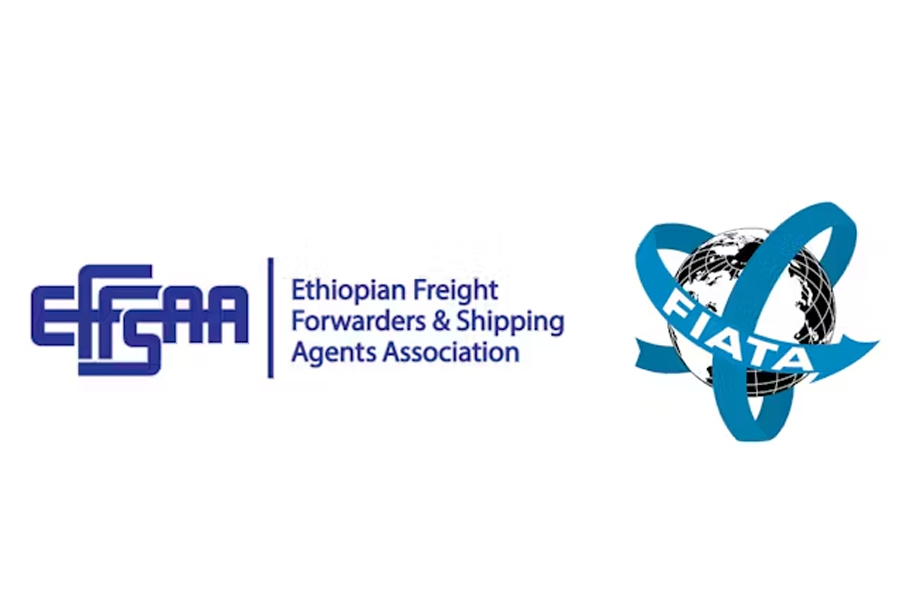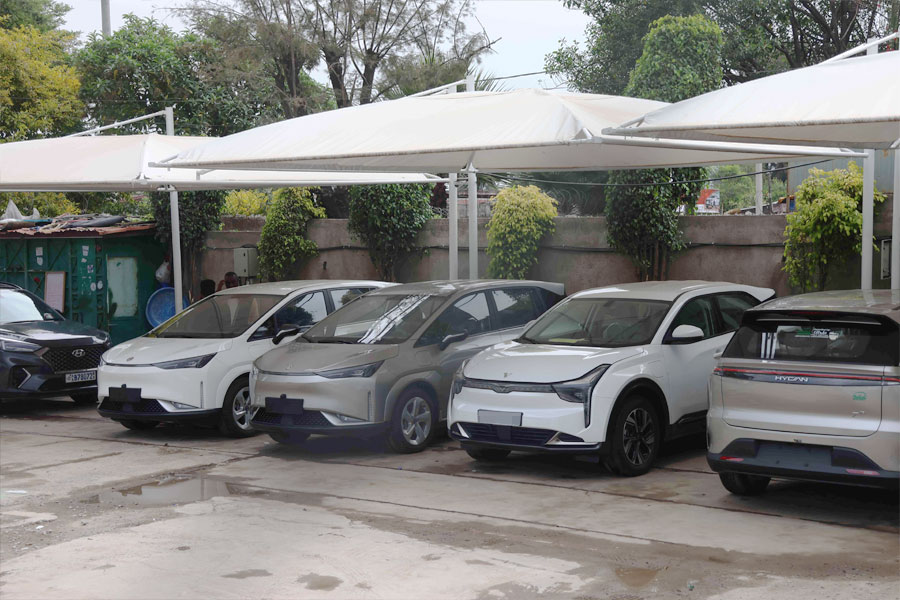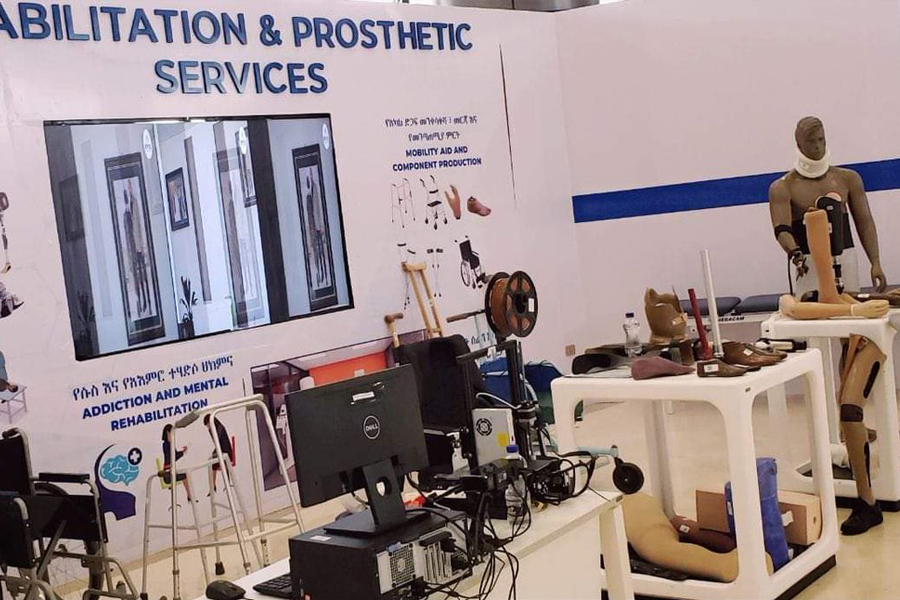
Commentaries | Jul 22,2023
A father of two with another child on the way saved up 17,000 Br for half a year at one of the microfinance institutions and was provided with a loan of 400,000 Br to be paid off in three years. A taxi driver in his spare time, he wanted to buy another car and rent it out to sustain his family using the earnings.
Right when he was about to buy a 2004 model Toyota Vitz with the loan provided by the microfinance institution and additional investment from his savings, the price of cars underwent an insurmountable price increase. Left with no viable alternatives, he decided to buy a used 2007 Toyota Yaris with manual transmission for 600,000 Br off an individual seller, maxing out all his savings.
He remarks that he was even lucky to have found a great price as the current market value for the car is around 720,000 Br.
“I had to borrow money to proceed with licensing,” he said.
This is hardly a unique story; the same has repeatedly happened as vehicles' prices continue their relentless climb.
Dawit Getachew, a car dealer working in the Sebara Babur and Qera areas for four years, explains that the price increases over the past year are pulling the dream of owning a car far beyond the reach of the average person. He testifies that he has seen significant changes at his dealership during this time.
He recalls that a 2004 Toyota Vitz was being sold for around 500,000 Br just a year ago, but the same car now goes for around 800,000 Br. He blames a shortfall in imports and unmatched demand as the main cause of the price hike.
Data from the Ethiopian Customs Commission confirms the import decline. In the first half of the past fiscal year, about 27,000 cars were imported, while so far this fiscal year, only about 19,000 cars have been imported.
Not only has the price of Toyota Vitz models increased, but the tendency of sellers to import used cars has significantly dropped, which has exacerbated the situation. Not many used Toyota models, including Vitz, Yaris, Platz and Corolla models, have been imported since the implementation of an excise bill a year ago.
Aimed at discouraging the import and sale of used cars, the government enacted an excise tax law that imposes a hefty tax on used cars in January of last year. The law levies the lower 105pc excise tax on cars aged two to four years and the highest 405pc tax on cars over seven years of age with an engine capacity of 1,300cc.
New and fully-assembled cars are only subject to 60pc of the excise tax. Additionally, electric cars were completely exempted, while hybrid cars and car parts imported for assembly were subject to an excise tax of five percent.
Lowering fuel consumption and preventing environmental pollution caused by older cars are the aims of the excise tax, according to Mulay Weldu, director of tax policy at the Ministry of Finance.
This chart compares car import data from the first half of this fiscal year with the previous fiscal year. The volume of imported cars is down, but the average price is substantially higher.
"The other motive is to incentivise local assemblers to go into business," said Mulay.
This measure seems to meet its target. Dawit says that many people engaged in the import and sale of used cars have gone out of business as well.
Mulay says the Ministry, in collaboration with the Ethiopian Customs Commission, is conducting a study to assess the impact of the excise tax and indicated his belief that the shortage of supply and the increase in prices might not entirely be due to the implementation of the excise tax.
Yet the new law highly affected the import of Vitz, Yaris and Corolla models manufactured by the Japanese manufacturing giant Toyota Motor Corporation.
Dealers and importers in the market explain that these models are the perfect fit for living conditions in the country. The models are small in design, do not consume too much fuel, and are affordable, making them desirable to middle-income individuals and suitable for business activities such as car rental and ride-hailing services.
Excise tax is one big cause for the price rise of vehicles, but it is accompanied by inflation. In a country where non-food inflation has been in the double digits for the past three years, a year-to-year increase in car prices is expected.
Non-food inflation over the past decade has averaged 13.7pc. However, this time around, various factors have come into play: the implementation of the excise tax on imports, a shortfall in supply, and the scarcity of foreign exchange are among the major ones dampening the hopes of would-be car owners.
With the implementation of the excise tax law, the trend of car imports seems to have shifted. Passing dealerships, one can easily notice that the type of cars on display, previously dominated by Toyota Vitz, Yaris and Platz models, has changed to newer models such as the Hyundai Tucson and the Suzuki Desire.
A car dealer located the Mesqel Flower area testifies to this. The place that has been selling older used cars for years is now selling 2020 and 2021 Mitsubishi and Suzuki models, which go for anywhere between 1.2 million Br and three million Birr.
The owner, who wished to remain anonymous, says that the price of Vitz models, which started gaining popularity in Ethiopia about a decade ago, has increased by 70,000 Br to 80,000 Br over the past few weeks.
"We resorted to selling brand new cars as customers are hesitant to spend close to a million Birr on a Vitz when they can buy new cars for a little over a million Birr," he said.
Tito Car Lot, located around Mesqel Flower, also shifted to selling newer models after the legislation of the excise tax law.
There is a sizable demand for new cars whose prices went up two months ago by up to 200,000 Br, according to Musse Bogale, a sales officer at Tito.
A good example of this is the company's sales of 2021 Hyundai Tucson models that arrived two weeks ago. In just a fortnight, Tito managed to sell seven of these cars for the price of about 4.2 million Br each.
Data from the Customs Commission aligns with this. Out of the 19,000 cars imported during the first half of this fiscal year, 80pc of them were brand new. However, from the 27,000 cars that were imported over the same period during the last fiscal year, only 22pc of them were brand new. This demonstrates that the percentage share of new cars from total vehicle imports went up by four-fold just in a year.
Import value has also shown a noticeable change. At the beginning of the past fiscal year, the average unit cost of imported automobiles was around 590,000 Br. However, six months down the road, that average price showed a spike, reaching 707,000 Br a unit. Six months into the current fiscal year, the data shows that the price has reached 1.07 million Br, a dramatic 81pc increase from 2019.
Though the import of brand new cars is increasing, the aggregate vehicle import volume has slumped.
"It's not just vehicles, the import of most commodities has decreased," said Azezew Chane, deputy commissioner of the Ethiopian Customs Commission. "The import of used cars has almost stopped in comparison to past years."
On top of that, the import of new cars is not at the expected levels, and it is not compensating for the falling volume of the used cars, said Azezew.
The other benefit of importing new cars the government officials mention is preventing under-invoicing since the cars are directly bought from wholesalers. Because of that, importing now requires higher investments than it did before the excise law was enacted.
Azezew says that this could be a factor in the lower-than-anticipated import volumes.
Solomon Alamirew, a consultant with over two decades of experience in accounting, management and taxes, agrees with the deputy commissioner's impression.
Used cars were often acquired by under-invoicing since the actual transaction was untraceable and dealers could get away with paying less tax and making more profit, according to Solomon.
Besides policy frameworks like the excise tax law, one of the major thorns in the sides of a car importer is the shortage of foreign exchange. The country is currently going through a severe forex crunch.
A manager at an Isuzu vehicle importer who requested to remain anonymous told Fortunethat the company is in bad shape as it has not been provided with a dime in foreign exchange since 2016. The company used to import up to 180 Isuzu vehicles a year before 2016. Since then, it has been importing less than 150 vehicles through payments made from a diaspora account. The company has now nearly stopped selling vehicles.
In addition, last year was remarkably devastating for the company as banks were going through a severe liquidity crisis and the company failed to deliver a 40-million-Br purchase order.
Last year, the price of an Isuzu FSR model increased from 2.9 million Br to 3.4 million Br, and prices for an Isuzu NPR doubled from 850,000 Br to 1.7 million Br, according to the manager.
Solomon states that the forex crunch has indeed been a challenge for the sector. He pointed out the tight monetary restrictions recently enacted by the National Bank of Ethiopia, such as limits on transaction frequencies and amounts, has inhibited importers from utilising other means of attaining foreign currency.
Dealers were previously able to work with individuals who were willing to pay for the vehicles in foreign currency and have the value transferred to local accounts in Birr but the central bank's policies mean that this method is no longer viable, according to him.
There are other issues too.
Though new cars may be more fuel-efficient and environmentally friendly, they also have their drawbacks. Higher expenses for spare parts and insurance discourage people from buying new cars, the expert explained.
One could spend 10,000 Br or 15,000 Br for replacing parts in old cars whereas those same parts in new cars can cost 50,000 Br or 60,000 Br, according to him.
"Speaking as a user, the expense that empties our pockets is spare parts," he said.
The expert also indicated the sector is in dire need of intervention, suggesting two solutions to address the current issues in the market. Addressing the foreign currency shortage which importers are being challenged with and allowing maintenance inputs to be imported smoothly so that unaffordable spare parts will not be an issue to consider when purchasing newer cars could alleviate the problem somewhat, according to him.
PUBLISHED ON
Mar 06,2021 [ VOL
21 , NO
1088]

Commentaries | Jul 22,2023

Radar | Oct 12,2024

Commentaries | Mar 20,2021

Featured | Sep 29,2024

Radar | Mar 25,2023

View From Arada | Jul 22,2023

Commentaries | May 25,2024

Radar | May 06,2023

Life Matters | Jul 15,2023

Radar | Sep 14,2024

Dec 22 , 2024 . By TIZITA SHEWAFERAW
Charged with transforming colossal state-owned enterprises into modern and competitiv...

Aug 18 , 2024 . By AKSAH ITALO
Although predictable Yonas Zerihun's job in the ride-hailing service is not immune to...

Jul 28 , 2024 . By TIZITA SHEWAFERAW
Unhabitual, perhaps too many, Samuel Gebreyohannes, 38, used to occasionally enjoy a couple of beers at breakfast. However, he recently swit...

Jul 13 , 2024 . By AKSAH ITALO
Investors who rely on tractors, trucks, and field vehicles for commuting, transporting commodities, and f...

Nov 1 , 2025
The National Bank of Ethiopia (NBE) issued a statement two weeks ago that appeared to...

Oct 25 , 2025
The regulatory machinery is on overdrive. In only two years, no fewer than 35 new pro...

Oct 18 , 2025
The political establishment, notably the ruling party and its top brass, has become p...

Oct 11 , 2025
Ladislas Farago, a roving Associated Press (AP) correspondent, arrived in Ethiopia in...